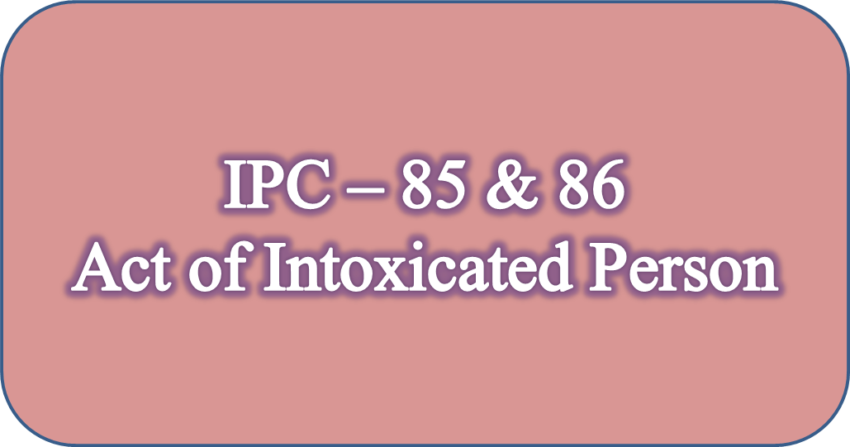IPC 85 & 86
Section. 85 –“Act of a person incapable of judgement by reason of intoxication caused against his will.”
Whenever any act is done by a person who is incapable of knowing the nature of the act that he is doing either wrong or contrary to law due to intoxication then the act shall not be an offence. If the thing which intoxicated him was administered to him without his knowledge or against his will.
The act is exempted under the code from criminal liability where the accused is not charged of the crime committed. As the act shows absence of mens rea i.e. guilty mind. While Actus reus and mens rea are two essential elements to impose criminal liability on accused.
According to Principle of criminal liability in IPC which is basis on latin maxim “Actus non faciet reum nisi mens sit rea”
Essential elements of section 84-
- Accused was of intoxicated when committed the offence; and
- He was not capable of knowing the nature of the act; or
- The act was contrary to law; or
- The act was wrong
- Intoxication should be without his knowledge or against his will.
Case Law:
Chet Ram v. State, 1971 CrLJ 1246
It is held that Voluntary drunkenness is no excuse for the commission of a crime.
Venkappa Kannappa Chowdari v. State of Karnataka, 1996 CrLJ 15 ( Kar)
A person cannot become himself drunk with liquor and commit an offence and then come and say that he had consumed the liquor and therefore, the benefit of Section85 should be given to him.
Mobeni Minji, 1982 CrLJ NOC 39 ( Gau.)
The law prounces that the obscuration and divestment of that judgement and human feeling which in a sober state would have prevented the accused from offending, shall not, when produced by his voilutary act, screen him from punishment, although he be no longer cpapble of self – restraint.
Bablu v. State of Rajasthan, AIR 2007 SC 697
It is held that under the section 84 a person will be exonerated from liability for doing an act while in a state of intoxication if he at the time of doing it, by reason of intoxication was incapable of knowing the nature of the act, or that he was doing what was either wrong or contraryto law if the thing which intoxicated him was delivered to him without his knowledge or against his will.
Director of Public Prosecutions v. Beard,(1920) AC 479
The accused ravished a girl of 13 years of age and infurtherance of the act of rape,placed his hand upon her mouth and his thumb upon her throat, thereby causing death by suffocation. The sole defence was a plea of drunkenness. It was confined that drunkenness was no defence unless it could be set that the accused at the time of committing rape was so drunk that he was incapable of forming the intent to commit it inasmuch as the death resulted from a succession of acts, the rape and the act of violence causing suffocation, which could not be regarded independently of each other and that the accused was guilty of murder.
Section. 86 – “Offence requiring a particular intent or knowledge committed by one who is intoxicated.”
Whenever any act is done with a particular knowledge or intention then the act shall be an offence.The person shall be liable.
Whenever a person does an act in the state of intoxication then it shall be presumed that the person had same knowledge as without intoxication unless the thing which intoxicated him was administered to him without his knowledge or against his will. The burden of proof shall be on accused.
Whenever in any case specific intention is required then there would not be any presumption about intention. It would be proved like other cases and the burden of proof shall be on prosecution.
In other words,
This section clearify something regarding presumption.There may be cases in which a particular knowledge is an ingredient, and there may be other cases in which a particular intent is an ingredient,
In case of voluntary intoxication, Knowledge is to be presumed in the same manner as if there was no intoxication but there is no such presumption with regard to intention.
Case Law:
Section 85 & 86
State of Maharashtra v. Ashok Yashwant, 1987 CrLJ 1416 ( Bom.)
The reading of sections 85 and 86 together makes it clear that section 86 is an exception to Section 85. The sections show that when the intoxication is instigated voluntarily, then done act is an offence even if the person is incapable of knowing the nature of the act or the act was contrary to law or the act was wrong.This section obviously covers all offences.
This section takes care of such offences and states that if intoxication is involuntary, neither knowledge nor intention in committing the offence will be presumed.
If it is voluntary then only knowledge of the offence on the part of the offender will be presumed but not intention in committing it.
What Section 86 means and and no more as compared to Section 85.
The degree of intoxication demanded by both sections, however, remains the same. In fact,
The conclusion is inescapable that to avail of the exception under section 86, the degree of intoxication of the offender must be such that he is incapable of knowing the nature of the act or the act is wrong or the act is contrary to law.
Cases relating to Section 86
Gautam Bhila Ahire v. State of Maharashtra, 2010 CrLJ 4073 (Bom.)
Accused husband beating his wife and throwing burning lamp on her under the influence of liquor. Since he himself consumed the liquor he is not entitled to claim benefit under section 86 of IPC, 1860.
Shankar Jaiswara v. State of WB, (2007) 9 SCC 360
Act of the accused of walking a distance to the house of a witness and concealing the weapon and his wearing apparels showed that he was conscious and capable of understanding of his act. No evidence as regards the degree of intoxication or any evidence of any attending general circumstances to arrive at a conclusion that accused was beside his mind altogether temporarily at time incident.
Babu Sadashiv Jadhav v. State of Maharashtra, 1984 CrLJ 739 (Bom.)
On the basis of evidence in this case it cannot be said that the accused was so much intoxicated at the time of the incident that he was beside his mind altogether for the time being. He did set his wife on Fire, but as soon as her saree started burning he realised the folly of his act and started extinguishing the fire. The facts are showing that he was not so much intoxicated that he could not know the nature of act. So the general rule that a man is presumed to intend the natural consequences of his act can be applied to him also. Conviction under Section 302 IPC, 1860 altered to one under section 304(1) IPC,, 1860.
Mahvari Surya Satyanarayan vs State of AP 1995 crlj 689
In case of voluntary drunkenness, it will be deemed to be a case of no drunkenness so far as knowledge is concerned. As the word intention has not been mentioned in the second part, it means the Parliament wanted that the word ‘intention’ should not be presumed even in the case of an act done in a drunken state of mind. Therefore, whether the accused was having intention or not while committing an act cannot be presumed as in case of knowledge.
Dil Mohammed AIR 1956 SC 488
As certain guilty knowledge or intention forms part of the definition of many offences, this section is provided to meet those cases. It says that a person voluntarily intoxicated will be deemed to have the same knowledge as he would have had if he had not been intoxicated. There may be cases in which particular knowledge is an ingredient, and there may be other cases in which a particular intent is an ingredient, the two not being necessarily always identical. The section nowhere says that the accused shall be liable to be dealt with as if he had the similar intention as might have been assumed if he had not been toxicated. Therefore, although there is a presumption so far as knowledge is concerned, there is no such presumption with regard to intention.
Pal Singh, (1917) PR No.28 of 1917.
The section 86 attributes to a drunken man the knowledge of a Sober man when judging of his action but does not give him the same intention.
Samman Singh (1941) 24 Lah 39 The presumption may be rebutted by his showing that at the time he did the act, his mind was so affected by the drink he had taken that he was in capable of forming the intention requisite for making his act the offence charged against him.

